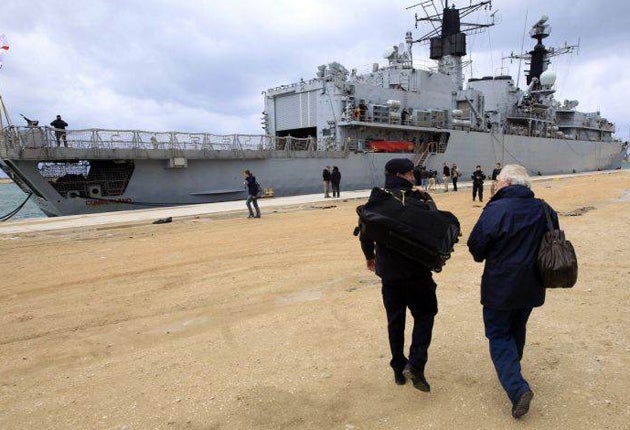Libya escapees tell of looting in the oilfields

The last group of Britons believed to still be in Libya streamed on to a Royal Navy frigate yesterday, bringing with them stories of looting and lawlessness that spoke of devastating damage to the country's oil infrastructure.
The majority climbing the gangplank to HMS Cumberland for a transit to Malta were oil workers who had been trapped for days in the desert covering the south of the country, and had witnessed drilling rigs being stripped of equipment and Bedouin tribes robbing at gun point.
"There's now no law down there," said Simon Robinson, who had been in charge of one of the rigs. "Gangs are stealing anything they can get their hands on. I had a vehicle stolen directly off me. Three guys appeared with AK-47s. I know exactly which kind of gun it was as I can remember reading the small print on the barrel when one was pointed at me."
Away from the fertile strip of land that borders the Mediterranean, Libya is largely a barren, arid country with the compounds run by the international oil companies often hundreds of miles from the nearest habitation.
It is an area with a long-held reputation for banditry, and many of the oil companies prefer, even in safer times, to bring their people in and out on light aircraft. This escape route was not an option, however, once Libya was engulfed by the revolution that may now finally end Col Muammar Gaddafi's repressive rule.
Mr Robinson, whose rig was in the south-eastern drilling zone known as area 103, said he and his men were left stranded for several days while he pleaded with his US-based oil company Occidental to send help.
"The company said it was going to send mercenaries such as Blackwater or an equivalent. But they never arrived. Some of my Libyan men said they would go and get help. Two days later they came back with a pick-up truck and two Land-Rovers. We piled the vehicles with whatever supplies we needed and they drove us out of there. I'm so grateful to them for coming back for us."
The Cumberland arrived at Benghazi port shortly just after 12 noon and left with more than 200 passengers, all of whom were offered sea sickness pills as the coast was buffeted by 35 knot winds and a rolling sea. She is expected to reach Malta by lunchtime today. The British escapees, who included a nine-year-old girl and her Liverpudlian mother, made up a quarter of those rescued by the ship. On board were also Australians, Canadians, New Zealanders and Europeans.
It was the second time the ship had taken refugees from Benghazi. The previous Friday it picked up 207 people, and its departure yesterday marked the expected end of the evacuation of British nationals, which included two Hercules aircraft entering Libya on Saturday to rescue other oil workers stranded deep in the desert. Another three Hercules flights picked up 150 civilians yesterday, understood to include several Britons. Only a handful more are now thought to be left and they are understood to have refused to leave. Among them are two oil engineers who have insisted on continuing to man the Sarir oil well deep in the country's interior.
Other nations have organised rescue missions. Beijing hired Greek cargo ships and a cruise liner to remove many of the 7,000 Chinese nationals believed to be stranded in eastern Libya, while the Tunisian government sent a ship to Benghazi to remove 450 of its people.
The oil industry is not the only one in which those leaving worked. Foreign nationals have been employed in many essential fields and it is feared their departure will hit hard at a time when the country is barely functional. Many hospitals, for example, were dependent on Eastern European doctors and Filipina nurses, most of whom have fled.
Moreover, the claims of damage to Libya's oil infrastructure will worry global economists, as any threat of a long-term reduction of the amount they can export risks driving prices higher.
Oil installations closer to the coast – and therefore more easily protected – are understood to have escaped relatively unharmed so far.
Nevertheless, the Libyan oil company Agico said it has been forced to cut daily output from 400,000 barrels per day to around 160,000.
Join our commenting forum
Join thought-provoking conversations, follow other Independent readers and see their replies
Comments
Bookmark popover
Removed from bookmarks